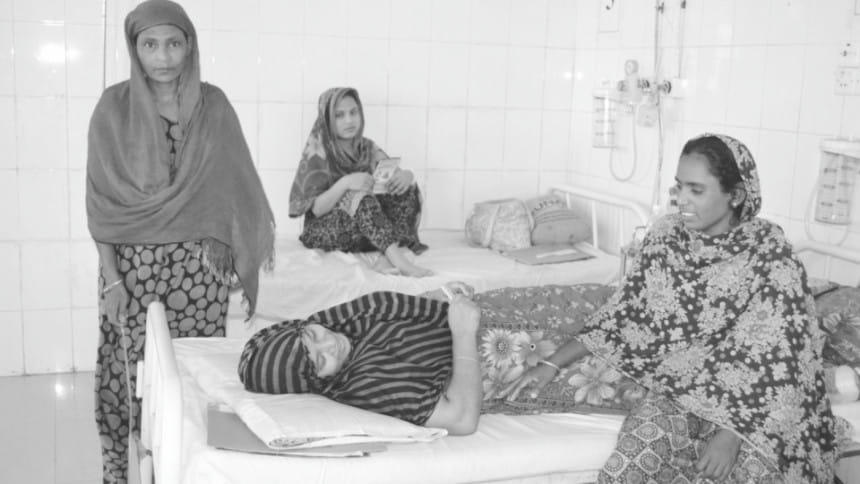Cast Away: The Stigma of Fistula

I had no idea, that there were so many women out there suffering the same fate as mine", says a surprised Zinara from Kushtia. She is one amongst many women recovering in the post-operative ward of the National Fistula Centre at the Dhaka Medical College Hospital. Zinara had to undergo surgery to repair her obstetric fistula.
Obstetric fistula is a childbirth injury that is usually caused by prolonged, obstructed labour, without timely medical intervention. During this period the sustained pressure of the baby's head on the mother's pelvic bone damages soft tissue, creating a hole - a fistula- in the birth canal. The fistula causes a constant leaking, causing the girls and women to lose control of bodily functions. The only treatment for obstetric fistula is a surgical procedure where the hole in the birth canal is repaired. Obstetric fistula has been recognized as a medical condition but now it needs to be acknowledged as a social one that requires attention and sensitivity.
The number of girls and women with obstetric fistula cases in Bangladesh is unknown; a survey is currently underway to determine the figures.Between 50 and 80 percent of women under the age of 20 in poor countries develop obstetric fistulas, and the youngest patients are merely 12 to13 years old. Due to the lack of education and inability to access proper health care these young girls live with this condition for years untreated, ashamed, and humiliated and in worse cases shunned by their own families; communities will even go as far as to justify the girls' suffering as a punishment or curse. The victims of the debilitating condition are often divorced from their husbands,and forced to live on their own without social interactions or possibilities to work. These women then face further poverty and the additional psychological distress of losing a child (in most cases prolonged labour leads to the death of the child).
Poverty lies at the root of this suffering. The widely practiced tradition of child marriage puts young girls under immense social pressure to conceive right after marriage; unknowingly this makes them likelier to develop obstetric fistula during the delivery of the child, as their bodies are not matured enough for the strenuous delivery.
The United Nations Population Fund (UNFPA) has been working with the Ministry of Health and Family Welfare to ensure victims of fistula receive the treatment and rehabilitation they need. As part of these efforts doctors are trained and learn from renowned national and international fistula surgeons. Furthermore 500 midwives will graduate from a UNFPA supported program and will provide a whole continuum of care such as adolescent health care, family planning, antenatal care, safe delivery and early detection of complications which can prevent fistula as well as ensure the lives of mothers and babies. UNFPA is the sole organization to support all rehabilitation centres in the country; one of them is located in Bokshibazaar near the Dhaka Medical College Hospital. At the rehabilitation centre, survivors of fistula are provided with skill training to aid their rehabilitation and integration back into their own communities. Other private facilities run with support of the development partners and dedicated fistula surgeons.
Ways to prevent obstetric fistula start by,
Delaying marriage: The younger the girl the likelier that she will die or develop obstetric fistula during labour.
Birth spacing: Providing women access to family planning services reduces probabilities of developing obstetric fistula.
Attending health care services: Antenatal visits, delivering at the health facilities with the help of a midwife and attending postnatal care visits ensure early detection of complications.
Comprehensive sexuality education for boys and girls: When girls are educated about the rights concerning their body and reproduction and get necessary services, rate of maternal complications and mortality decreases. Communities need to be made aware of preventive measures against obstetric fistula and the treatments that are currently available so that women have a chance at a better life. Most women who recover from obstetric fistula through surgery, become community fistula advocates. They educate their community and women regarding the availability of treatment for obstetric fistula.
The 23rd of May is the International Day to End Obstetric Fistula. The theme for 2015: "End Fistula Now, Restore Women's Dignity" lies at the heart of UNFPA's goals to improve maternal health in Bangladesh. The eradication of fistula can be achieved through the cooperation and commitment from all strata of society, including individuals, families, health-care providers and leaders.
Zinara was lucky, she survived the complications related to giving birth at too young an age and has received treatment and rehabilitation for obstetric fistula. Many other girls and women have not been so lucky.

 For all latest news, follow The Daily Star's Google News channel.
For all latest news, follow The Daily Star's Google News channel. 



Comments